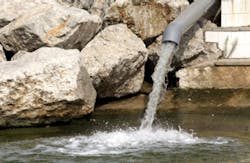EPA’s fracking wastewater ruling stirs controversy
WASHINGTON — The U.S. Environmental Protection Agency (EPA) has ruled that municipal water treatment plants cannot accept fracking waste, attracting support and critics, according to stateimpact.npr.org.
Advocates believe the measure will protect water supplies from contamination, while opposing parties such as Independent Petroleum Association of America critique the ruling for being short-sighted and violating the Clean Water Act, noted the article.
IPAA wants the EPA to require plants to treat fracking wastewater rather than imposing a ban, stated the article. Natural gas companies have sent this waste to municipal plants in the past, and they sometimes request to continue to doing it.
"The agency [EPA] said the rule would remove regulatory uncertainty, and ease the pressure on local plants to respond to any such requests," reported the article. Environmentalists say treatment plants do not have the technology to remove the types of contaminants used in fracking.
Concerns also exist over the creation of new toxins when frack waste combines with chlorine, shared the article. U.S. Rep. Matt Cartwright of Pennsylvania said the combination has been linked to "bladder cancer, miscarriages and still births."
A study from Environmental Science & Technology revealed processes such as reverse osmosis or thermal are needed to properly remove wastewater toxins, noted the article. Otherwise it could create carcinogens.
An agreement in Pennsylvania stopped the gas industry from sending waste to treatment facilities, and Cartwright said in the article the new rule will cease the practice across the country.
Click here to read the entire article.
